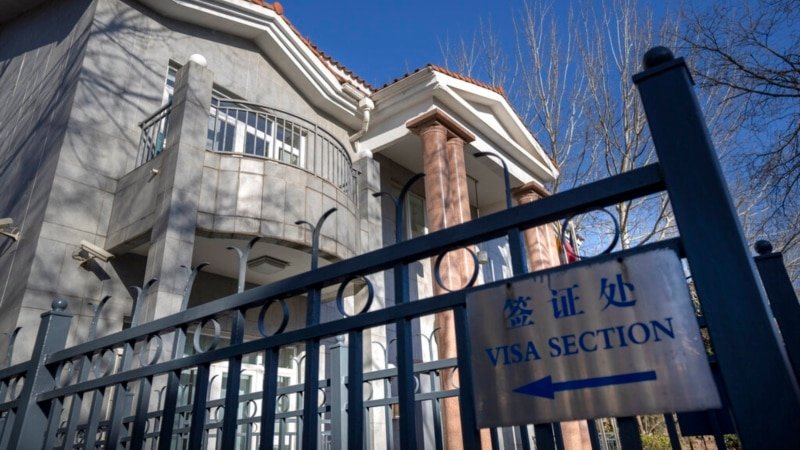
Lithuania’s new government is facing challenges before it even begins, pledging to reset diplomatic ties with China after Beijing downgraded bilateral ties with the country in 2021.
Analysts say Lithuania’s recent decision to expel three Chinese diplomats and the damage caused to two data cables in the Baltic Sea — as well as questions about the role of a Chinese cargo ship — are complicating that effort.
China downgraded ties with Lithuania after the previous government agreed to open a representative office for Taiwan in the capital Vilnius in 2021, whose name used the English word “Taiwanese”. Beijing shys away from any move to bring international recognition to democratically ruled Taiwan.
Most of Taiwan’s foreign representative offices have Taipei in their names.
balancing act
Tomas Geneliunas, professor of international relations at Vilnius University, says Lithuania’s new government will have to play a balancing role when it comes to relations with China as every change in the geopolitical landscape could have an impact.
“When a new tension point breaks out, Lithuania will have no choice but to abandon this balancing policy and return to more aggressive diplomacy toward China,” he told VOA in a phone interview this week.
Following his parliamentary elections in October, Lithuania’s new Prime Minister, Gintautas Palukas, vowed to restore full diplomatic relations with China. Without “humiliating” Lithuania and “Fall on our knees and ask for anything.”
In an interview with the Baltic News Service on November 1, Palukas said that it is certainly an aspiration to have normal relations with China.
Relations with China “will not be very good”, with both sides arguing about economic and protectionist measures, but the EU “is Trying to maintain diplomatic relations,” He said.
“We are a sovereign country, we have no dependence on China, and no one is trying to create one, but diplomatic relations are valuable. And somebody really needs them,” he said.
Zhao Junjie, a senior research fellow at the Institute of European Studies at the Chinese Academy of Social Sciences, told the Chinese state-run tabloid Global Times Palukas’ comments suggest that the new Lithuania government is “turning towards more rational, practical and sustainable ways” of handling relations with China.
Different views of the new government
Despite the new Prime Minister’s stated intention to resume diplomatic exchanges with Beijing, there are also differing views within the new government on how Lithuania should handle relations with China.
Lithuanian government latest four year planwhich the country’s parliament approved on December 12, describes China as “a growing challenge” to the Baltic state’s foreign and security policies. The plan also promises to develop economic and cultural ties with Taiwan, which China considers an inalienable part of its territory.
In an interview with the Baltic News Service on December 3, Lithuania’s new Foreign Minister, Kęstutis Budrys, said China is responsible Taking steps to restore diplomatic relations with Lithuania.
Budrys said, “It was not Lithuania that decided to reduce the level of diplomatic representation and took the initiative to completely change its format.” He said all sides of Lithuania’s political spectrum support the resumption of diplomatic relations with China if the Baltic state’s national security is at risk. It was ensured.
Meanwhile, Lithuania’s Minister of Economy and Innovation Lukas Savikas said in an interview on December 12 that the previous government’s position on China was “out of line” And that Lithuanian businesses are interested in the Chinese market.
Experts say that since the new government has clearly presented China as a foreign policy and security challenge to Lithuania, Vilnius is unlikely to fundamentally change its policies towards China.
While “the previous government, which pursued a so-called value-based foreign policy, had only vaguely mentioned China in its programme, the new government” [government’s] The program makes the boundaries more clear in this regard,” said Rygirdas Boruta, an associate expert at Vilnius University’s Center for Eastern Europe Studies.
As the new government has promised to develop economic and cultural ties with Taiwan, Boruta told VOA that Lithuania is unlikely to make fundamental changes to its relations with China under a center-left-led administration.
aggressive actor
Other recent events have also added new sources of tension to bilateral relations.
In late November, a Chinese bulk carrier carrying Russian fertilizer, the Yi Peng 3, was suspected of severing two data cables in the Baltic Sea, prompting investigators from several European countries, including Sweden, Lithuania and Finland, to surround and detain the ship. Tried to take it in. Intensive investigation.
Additionally, Lithuania announced Expulsion of three Chinese diplomats After declaring him “persona non grata” on 29 November. The Lithuanian Foreign Ministry said the Chinese diplomats violated the Vienna Convention and Lithuanian law, but did not provide further details about the expulsion.
Beijing condemned Lithuania’s expulsion of Chinese diplomats, calling the move “provocative”.
“China reserves the right to take retaliatory measures against Lithuania,” the Chinese Foreign Ministry said in a statement released on December 2.
Janeliunas said that these events have hardened the Lithuanian public’s perception of China as an aggressive actor in the Baltic region, making it difficult for the new government to ease tensions between the two countries.
If the government talks about softening Lithuania’s attitude towards China, it may cause some harsh reactions from society or some media outlets, as they question why the ruling Social Democrats are considering such a step. Are doing,” he said.